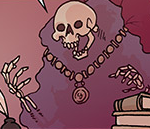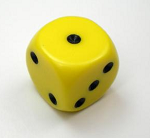|
I think considering the players an audience rather than participants is a fundamental mistake. At the very least, it's an assumption about the dynamics of play that puts a huge, disproportionate burden on one person where there doesn't necessarily have to be one, while also doing the exact reverse of that to agency. Maybe, occasionally, it's the correct dynamic to adopt, but it shouldn't be the default advice for someone who's struggling.
|
|
|
|

|
| # ? Jun 11, 2024 23:58 |
|
Tuxedo Catfish posted:Maybe don't make absolute statements if you can't handle the same level of discourse in return. quote:If you don't ever want player skill to substitute for character skill, go play a storygame instead of making GBS threads up tactical combat-centric games with obsolete concepts from the 90s.  at "not being a cheating piece of poo poo" being an obsolete concept, or that it's only a problem if it takes up time. Your perfect game is, going by your posts, one in which all stats are known but then we decide after rolling if they actually count. That's not even a game at that point, story- or otherwise. What are you even doing at that point? There's nothing to discover, since you get to look at everything beforehand and prep like you're going into a WoW raid. You're not playing to advance the plot, since you're already decided that you're just going to call do-overs if it goes poorly. Why even have the combat at all? Just say "you fought the bad guy and won, hooray!" and throw some confetti around. at "not being a cheating piece of poo poo" being an obsolete concept, or that it's only a problem if it takes up time. Your perfect game is, going by your posts, one in which all stats are known but then we decide after rolling if they actually count. That's not even a game at that point, story- or otherwise. What are you even doing at that point? There's nothing to discover, since you get to look at everything beforehand and prep like you're going into a WoW raid. You're not playing to advance the plot, since you're already decided that you're just going to call do-overs if it goes poorly. Why even have the combat at all? Just say "you fought the bad guy and won, hooray!" and throw some confetti around. Tuxedo Catfish posted:"I have mastered an incredibly complex and internally balanced system of rules so that I can then throw them out and wing it when those rules break down. I am however careful to keep all authority and mechanical task resolution to myself so that I can do this without anyone else ever noticing that there's a problem. On an unrelated note, GM burnout is real, my players don't see the point of playing any other system, and there's visible confusion and frustration at my table about what mode of play is appropriate. What am I doing wrong?"
|
|
|
|
Yawgmoth posted:Maybe have an actual argument against said statement instead of saying "nuh uh!" like a 4 year old. ... and I'm the one inventing imaginary enemies? Anyways, the only point of yours I disputed that wasn't a purely subjective matter of taste was (b), and I did, in fact, explain why it's wrong: Tuxedo Catfish posted:e: It stops you from changing things invisibly, but that's completely unnecessary anyways. Either present a game of (player) skill and play by the rules so the challenge is meaningful, or talk to your players about why you aren't and move forward on consensus. Tuxedo Catfish fucked around with this message at 03:03 on Jan 17, 2020 |
|
|
|
If knowing the enemy's abilities makes your game's combat completely shallow and devoid of meaningful choice, then it was always shallow and the only thing hiding it did was making it harder to realize that. Fortunately for people who enjoy tactical challenges, there are countless games with complete information symmetry (or close to it) that, nonetheless, have enough meaningful decisions for mastery and growth to be possible. Which, in turn, is the point: mastery and growth are fun. You keep telling me I should gently caress off and play video games instead -- as if a medium where rules are consistently applied and playtesting is a real thing instead of a mythical ideal were somehow a bad thing -- but maybe you should try playing a few yourself. It might provide some valuable insight into design that GMs, and RPGs as a medium, could really use.
|
|
|
|
It's not that you're wholly wrong, you're just writing in absolutes and being somewhat toxic and communicating in a sarcastic and uninviting way.
|
|
|
|
ILL Machina posted:It's not that you're wholly wrong, you're just writing in absolutes and being somewhat toxic and communicating in a sarcastic and uninviting way. I'm a little frustrated by the constant repetition of bad advice that I've pushed back on more subtly in the past.
|
|
|
|
You make a good point that players shouldn't be considered an audience, but rather players in an improv troupe or the characters in a reality show or something, where they're ultimately responsible for the content. Part of that is making their decisions feel important. One way to achieve that is to be fully transparent mechanically. Another way gives the DM more power to adjust the numbers behind the circumstances but definitely risks a railroad and player trust. I'm sure a pragmatic approach works which, again, might just mean revealing the monster cards for every thing in combat and openly rolling.
|
|
|
|
Tuxedo Catfish posted:I'm a little frustrated by the constant repetition of bad advice that I've pushed back on more subtly in the past. Every page is a new world.
|
|
|
|
Also, to be clear: you shouldn't cheat or break the social contract at your table, even when the social contract includes things that are manifestly pointless or bad; mutual agreement is always step one. I thought I was clear on that right from my first post, but since it's among the things Yawgmoft is accusing me of, I wanted to revisit it.
|
|
|
|
I think metagaming is fine in highly tactical games and that monster moves should be telegraphed. Mechanical games are highly dependent on system mastery and it feels cheap to omit the information necessary to make tactical decisions. I don't always show them the whole stat block but I'm honest about what the potential outcome for any given action will be based on the monsters abilities.
Elderbean fucked around with this message at 04:24 on Jan 17, 2020 |
|
|
|
On the specific topic of encounter design, since a lot of what I've said has been abstract or big picture: If you look at encounter design in most modern RPGs -- MMOs or singleplayer, turn-based or action, casual or hardcore -- they almost always have a high degree of repetition in content, and allow you to try again on a failure very quickly. (This even applies across the casual/hardcore divide -- if you want to make a casual game you absolutely still want to have opportunities for the player to mess up, you just reduce the severity of the consequences, and present them in a gentler way -- a few minutes off your completion time instead of YOU DIED, for instance.) I don't play WoW specifically, but raids are designed to hold up to repeated playthroughs, improving your clear time, your resources consumed, not letting any party members get downed, avoiding or deliberately triggering enrage states, and so on. If you fail, you get to try again; eventually, you succeed, and succeed more handily after that. If you die in, say, Dark Souls -- a game that's notoriously harsh on this front -- all that really amounts to is a few minutes of runback and some lost resources. Lose a mission in something like X-Com or Fire Emblem and you might replay the scenario, or go back a few scenarios if you really wasted resources or backed yourself into a corner. Roguelikes have extreme penalties for dying, but compress what other games would spend days, weeks, or months on into something you can win in a few hours once you understand it. Not all games make this completely binary, either -- a lot of them condense the whole cycle of introduce concept -> experiment -> fail -> acclimate -> succeed into something that happens within the encounter, often in stages, rather than something that requires you to start over from scratch. However, for this to work, the encounter needs to be relatively "fine-grained" -- you need a lot of cycles where the player gets to see the enemy do something, decide how to respond, see how their response worked out, and, ideally, have some down time to think about and internalize that feedback before they act again. It also helps to introduce new wrinkles one at a time so the player doesn't get overwhelmed, and even more importantly, so that feedback in response to one unsolved problem doesn't get confused with feedback for a different unsolved problem, rendering the game opaque and frustrating the player. Part of the reason for this is simply to save developer effort, no doubt; you repeat stuff so you don't have to design more content. This is all well and good, but it's not the only reason for repetition; the other, even more basic one, is that repetition is a relatively foolproof, base-level way of teaching mechanics to the player. It's one of the least efficient, which I'll get into more in a second, but by designing your game so that players can retry indefinitely, it guarantees that even someone who never reads a Wiki or plugs numbers into a damage calculator, never hangs out in a discord asking questions of more knowledgeable players, or who never opens blessed fortune cookies or pays hard-earned money to the Oracle for dozens of games, can still learn how stuff works. Learning how stuff works is important because the process of discovery by itself is both pretty shallow, but also has to come before the much more robust process of figuring out preparation, counters, contingencies, good team play -- in a word, optimization. The deepest (and thus most satisfying) challenges tend to be ones where the players have to apply their own tools + resources to an obstacle they understand but have not yet conquered; the interaction between stuff the player has and stuff the obstacle presents creates a huge number of combinations, and the fact that the player knows all or most of the pieces means that their decision is based on information they have or could reasonably infer; a shot in the dark would be indistinguishable from luck, but predicting uncertain outcomes based on knowledge of the preconditions rewards skill. Applying this to tabletop games creates a problem, though: I have never in my life seen a TRPG with fine-grained encounters, and if one did exist it would probably take a million years to resolve them. D&D 4E is one of the most consciously well-designed games of its kind, and combats in that are designed to last 4-6 rounds, maybe less if the players hit on a good solution right away, and people already (justifiably!) complain that it moves too slowly. If you spend a turn introducing an enemy power in D&D 4E, that's a quarter of the encounter already over. If the players don't instantly understand its consequences and need to see it again before they start really thinking about how to counter or mitigate it, that's half the encounter over. Conversely, if the enemy does more than 1-2 things, their insight might never matter in the first place; the enemy might never use that power again! If you're interested in combat being a puzzle, something to which they can meaningfully apply their skill and familiarity with their characters' toolkit, then they need a pretty high degree of knowledge before you even roll initiative. This doesn't necessarily mean literally handing the players a stat sheet -- but only because that's clumsy, slow, and requires a lot of translation of specific individual numbers to conceptual information (e.g. "188 HP, 1d8+4 damage -> this is a huge tanky enemy but not a high priority in the damage race, pending more information about what else it does"). You do on the other hand want the players to know what the enemy does, and to have as much information as they need to formulate a plan, which probably means knowing all its abilities or all but a single surprise that re-contextualizes the rest of its kit (and ideally only if you know that enemy is going to survive long enough for it to matter). Knowledge checks are one way to do this... but honestly, knowledge checks suck. If they fail, all of the problems I just mentioned are still there; if nobody invested in the right knowledge skills, ditto. There's not really much reason to have them unless you're super-invested in the narrative of being a Smart Monster Stuff Knower, and for that to be something that distinguishes you from other players... and even that's kind of marginal because "knows stuff about monsters" is something you'd kind of expect to be baseline for an adventurer, and it distinguishing one character from another doesn't mean a ton if that information is going to be instantly shared with the party anyways. (And if it isn't being shared, what the gently caress, Dave?) A better way to do it is to work in as much repetition as you reasonably can, and then just explicitly tell the players the rest. Introduce adds / fodder enemies in encounters before the bossfight, and give the players ample opportunity to see how they work; that way they only have to learn about the boss's abilities in the climax. You can explicitly state what a monster is about to do at the top of the turn, which is incredibly easy to do in D&D and D&D-like games without really changing anything else about the system and makes things much more interesting. You can sprinkle in diegetic hints about a monster's powers (think tons of stone statues in a medusa's lair) although I would caution that doing this exclusively or about stuff that isn't an obvious pop culture reference is a bad idea because nothing is ever as obvious to other people as it is to the GM / author. The goal, however, is pretty much to give your players as much information as someone doing a raid would have, say, on the second or third try; to get them to a state where they're informed, they're already primed to improve and have "a-ha!" moments as often and with as much impact as possible, and then you can move on. It's also something which, as Elderbean notes, is specific to highly tactical games: if your game isn't about system mastery then obviously none of this means anything. If your game isn't about system mastery, though, then I'm begging you, please, play something other than D&D and its immediate cousins; the alternative means a ton of pointless work for you, and a lot of broken poo poo that doesn't work for me. Tuxedo Catfish fucked around with this message at 04:29 on Jan 17, 2020 |
|
|
|
anyways tl;dr the cure for metagaming is to completely embrace it, and using the term as a pejorative should die in the same ditch as "munchkinning"
|
|
|
|
Tuxedo Catfish posted:anyways tl;dr the cure for metagaming is to completely embrace it, and using the term as a pejorative should die in the same ditch as "munchkinning" I think all of that pretty much goes back to "Do whatever works for your table and don't be an rear end in a top hat as either a player or a GM." TORG: Eternity pretty well incorporates "meta-gaming" into actual play. The GM tells the players the difficulties they roll again, the toughness/damage/"to-hit" abilities of their opponents, all of that stuff. On the other hand, plenty of World of Darkness situations mean the dude who dresses like a homeless person is a homeless person. Or some kind of vampire god who just looks like a homeless person. And the only way you learn what damage he does is when he rips out your heart and stuffs it up your rear end.
|
|
|
|
The World of Darkness games are a bit of a rough example because they're both kind of an early, protoplasmic form of "fiction first" gaming -- I would say that for the most part they're not the kind of game I'm talking about, although I might make an exception for Werewolf: The Forsaken or certain modes of Demon: The Descent, and there might be comparable examples among the oWoD games -- but they're also really crunchy and have pretty strictly silo'd combat. I enjoy them, but I do not think they have a very clear identity along this axis and are the worse for it.
|
|
|
|
Like, compare blue book mortals or Vampire or whatever to Unknown Armies and tell me which game you think has a clearer idea of why its rules exist and what they're for.
|
|
|
|
As family and work commitments eat away at my available gaming time, I find I have less and less patience for games in which "system mastery" is even a thing. Like, I don't want to have to pore through books and supplements and do heavy math to figure out what the "optimum" character build or feat combo or class synergy is. Just loving get on with the story. "Tactical combat" in RPGs bores me to tears, but it's probably because I get that fix in tabletop wargames (which generally do a better job of it anyway because that's their focus). Further, repetition as a teaching concept sucks. "I swing my sword." "You miss" "I swing again." "Nope, still missed." What is that teaching you? What it should be teaching you is that inconsequential rolls (i.e. rolls where either the success or failure condition is "nothing happens") should be avoided at all costs, because all they're burning is the player's most valuable asset: their time.
|
|
|
|
Neither of those examples sound like problems with system mastery so much as builds mattering more than in-play decisions, and randomness, respectively. Like, no poo poo an example where the player never makes a decision doesn't have anything to learn from! There's no reason an RPG couldn't have tactical combat as good as a wargame except, in the loosest, incentive-based sense, that it's a little bit harder to sell a wargame with lovely gameplay than it is to sell an RPG with lovely gameplay. (And not by much, especially if you make up for it with good models.)
|
|
|
|
Or put another way: you wouldn't enjoy playing a wargame with co-op scenarios, better than 50% winrates so that you can relax a bit while still exercising the same mental muscles, an army that evolves over time, a narrative to explain how one match relates to another, and best of all, all of this at a fraction of the buy-in price of most wargames? Because that sounds great to me. 
|
|
|
|
Sanford posted:Yes. He nearly caused a TPK, because if he'd not looked it up I was planning to have it only do half damage. "he ran in to my knife. He ran into my knife ten times"
|
|
|
|
Strom Cuzewon posted:"he ran in to my knife. He ran into my knife ten times" I don't understand and I'm sorry to have caused such consternation in this, my favourite of all threads. I have resolved the initial issue by calling my friend a cheating motherfucker, he called me a lovely DM, and we all laughed. I hope this resolution is acceptable.
|
|
|
|
Sanford posted:I don't understand and I'm sorry to have caused such consternation in this, my favourite of all threads. I have resolved the initial issue by calling my friend a cheating motherfucker, he called me a lovely DM, and we all laughed. I hope this resolution is acceptable. Oh i was just making a joke about you blaming him for your decision to make it do more damage
|
|
|
|
Strom Cuzewon posted:Oh i was just making a joke about you blaming him for your decision to make it do more damage Oh yeah fair one. But he shouted out WHOAH IT'S GOING TO DO 12D8 DAMAGE WE'RE ALL GOING TO DIE. I don't want to make my friend a liar.
|
|
|
|
"Let me just grab my d8s here" and conspicuously pick up a bunch of d4s instead. Dare him to call you out on it.
|
|
|
|
Sanford posted:Oh yeah fair one. But he shouted out WHOAH IT'S GOING TO DO 12D8 DAMAGE WE'RE ALL GOING TO DIE. I don't want to make my friend a liar. Why not? You can just say its a lower level than the one in the book and have it do 6d8 or 12d4 or whatever. One of the problems here is that you weren't willing to call him out on his cheating.
|
|
|
|
I got lost in the weird discussion on the ethics of meta gaming.My Lovely Horse posted:I feel like "fae-enchanted" and "cursed" should, at best, be an academic difference and the subject of ongoing debate, and for all intents and purposes synonymous. Yeah this is pretty much the approach I'm taking with the fae in my setting. Not "random" as is usually implied, but like "i don't know what this magic does and neither does the enchanter" sort of thing. It's a tough rope to walk, and i don't want it to be "lol theyr so random."
|
|
|
|
Tuxedo Catfish posted:Or put another way: you wouldn't enjoy playing a wargame with co-op scenarios, better than 50% winrates so that you can relax a bit while still exercising the same mental muscles, an army that evolves over time, a narrative to explain how one match relates to another, and best of all, all of this at a fraction of the buy-in price of most wargames? Because that sounds great to me. Going back to the idea of "system mastery" in RPGs for a minute, it's worth noting that the more complex the mechanics are, the longer it takes to develop system mastery in any way that will be meaningfully beneficial to you in play. But this is predicated on the ideas that a) players actually want to spend this time, and b) that spending time outside the game to "git gud" inside the game is a desirable goal. For me, neither of these things is true. Hence my increasing love for less complex mechanics. If your game has trap choices or if it takes you longer than 5 minutes to explain character creation to me, you've pretty much lost me. I fully get that this is just, like, my opinion, man. But it comes from a place (severely cramped for available gaming time) that a lot of us older gamers find ourselves in these days. I was full-crunch Simulationist as gently caress in college - you know, when I lived down the hall from my players and thought nothing of cutting class to create a character using whatever super-complicated system was in vogue. Now? Not so much.
|
|
|
|
Panderfringe posted:Yeah this is pretty much the approach I'm taking with the fae in my setting. Not "random" as is usually implied, but like "i don't know what this magic does and neither does the enchanter" sort of thing. It's a tough rope to walk, and i don't want it to be "lol theyr so random."
|
|
|
|
Ilor posted:Fey magic should be indistinguishable from terrorism. Thread title for sure.
|
|
|
|
EthanSteele posted:Why not? You can just say its a lower level than the one in the book and have it do 6d8 or 12d4 or whatever. One of the problems here is that you weren't willing to call him out on his cheating. Well in the end it meant their NPC companions got flattened and they got through the final bit of the campaign by the skin of their teeth instead of breezing through it, so it was all good. As I said, we’ve called each other out on our poor handling of the situation since then and we’ll do better next time. It’s all good.
|
|
|
|
I feel like the talk of the importance of system mastery is addressed in Robin's Laws: get real crunchy and grognard if your group likes it, don't if they don't I got one guy at my table who is all about maximizing DPT, a lady who wants to make fart jokes and charisma skill rolls, and a guy who likes to message his wife when he's not front-and-center (and a few other players with different focuses)- imo the challenge of running a good game is catering to these playstyles while still maintaining a consistent GM style The audience analogy is incomplete, but so is the 'we're all actors' one- in my method, the GM is more like a stage director for an improv show, calling blocking and dialogue and scenes, helping players find their motivation, and making the payoff for that motivation worth it I'm of the opinion that the numbers only matter as far as they're useful, to build a sense of consistency- but I don't see the need to elevate that as the main reason to play, and neither do my players. If they get in the way of the narrative or, more importantly, in the way of fun, I discard them. In D&D, they're not as important as players usually think, anyway, but I do run the game as 'failure = interesting complications' and not 'failure = dead'
|
|
|
|
Peanut Butler posted:In D&D, they're not as important as players usually think, anyway, but I do run the game as 'failure = interesting complications' and not 'failure = dead' I feel like that's part of the problem, so many people only ever run things as failure=death so fudging becomes necessary to not completely derail everything they want to do. More games need to have examples for encounters that aren't to the death.
|
|
|
|
Tuxedo Catfish posted:I don't play WoW specifically, but raids are designed to hold up to repeated playthroughs, improving your clear time, your resources consumed, not letting any party members get downed, avoiding or deliberately triggering enrage states, and so on. If you fail, you get to try again; eventually, you succeed, and succeed more handily after that. If you die in, say, Dark Souls -- a game that's notoriously harsh on this front -- all that really amounts to is a few minutes of runback and some lost resources. As an aside, there's no reason you couldn't do this in D&D....... Zol, The King of the Gods is dissatisfied with their creation and is considering wiping it all out and starting again from scratch. However, Vira the Goddess of Justice has taken a shine to the mortal races, they are strong willed, resourceful and faithful and thus deserve to live. Arel, the God of War, argues they are craven, deceitful and weak and do not deserve such pity. After hearing both arguments, Zol proposes a contest to decide the fate of the mortal realm. A 'party' of mortals will be summoned to the celestial plane as representatives, where they will have to defeat a series of five challenges - if they succeed then the mortals will have proved they are worthy of continued existence, if they fail then the material plane (and all beings in it) will be destroyed. Arel will construct the challenges and Vira will choose the mortal challengers. Vira summons our brave party of adventurers to the celestial plane and briefs them on their task. - They will need to beat Arel's challenges in sequence (i.e. no long rests) - Vira can guide them on what to expect (watch out for this demon's fireball attack, this dracolich is immune to necrotic damage etc.) but cannot directly assist - The contest is about whether it is possible for mortals to even win once, there will be an unlimited number of attempts and they only need to a single success - Before each attempt the mortals will be able to change their preparation, within reason (changing spell lists or swapping armour ok, asking for a +4 battle axe probably not), as a test of their resourceful nature Good luck brave adventurers, hopefully you can save the world by Dark Soul-sing your way to victory with a living God instead of gamefaqs at your side. tanglewood1420 fucked around with this message at 01:41 on Jan 18, 2020 |
|
|
|
tanglewood1420 posted:As an aside, there's no reason you couldn't do this in D&D....... This is definitely something you could do in D&D. That said, figure that by attempt number seven against that dracolich, I and my character would be, "Can we just say that Arel was right and claim the reward of sweet, sweet, deathly oblivion? I don't wanna fight this loving thing again. Can we please play something else? Anything else?" Because if you're sitting in your room playing Dark Souls or Elder Scrolls or whatever and a dungeon/encounter/etc takes 10-15 minutes to go through, that's one thing. But when combat encounters in D&D with a decent sized group can run an hour or two (one large battle with a bunch of NPCs took five play sessions to resolve. That's over a month of "Roll to see if Guy A hits. Roll to see if Guy B hits, etc), replaying over and over again is probably some torture reserved for circle 8.5 of Gaming Hell.
|
|
|
|
D&D encounters aren't really fast enough (given they can take hours) or tactile enough for that sort of approach to work, it's just there as an illustration of the upsides in order to find different ways of achieving those upsides that DO work in D&D.
|
|
|
|
My approach to encounter-building in 4e is that if the only stakes are "does the party survive?", or if I can't figure out a way to have a TPKed party get their arses pulled out of the fire, then it's not important enough to be an encounter.
|
|
|
|
Whybird posted:My approach to encounter-building in 4e is that if the only stakes are "does the party survive?", or if I can't figure out a way to have a TPKed party get their arses pulled out of the fire, then it's not important enough to be an encounter. see also Fragged Aeternum making the PCs literally immortal but positioning them in the role of fighting a defensive war to protect civilians, or LANCER's setting where acquiring new mechs if your old ones get destroyed is trivial but only once you get back to base to 3D print them, at which point the situation has probably changed wherever you were fighting e: it's kind of a different level of abstraction, though Tuxedo Catfish fucked around with this message at 12:49 on Jan 18, 2020 |
|
|
|
There's also a houserule that one of my friends came up with and which I really like, which is the idea of a Rout. If the party declare a Rout during a combat, then all the PCs who are still alive survive, even ones on 0hp, but the party's goals for that fight go unachieved and they potentially enter a skill challenge or something to figure out what else goes wrong as they're getting away. So you always have a ripcord you can pull to cut your losses and avoid the game ending because of a few bad rolls, but you also keep the option to carry on pressing your luck in the full knowledge that this might mean death.
|
|
|
|
That's a rule-as-written in 13th Age, too, and one of the ones I like most.
|
|
|
|
I like the way the Storypath system handles stuff. If you take enough conditions or lose Health (for NPCs) you get "Taken Out." That doesn't mean you're dead, necessarily, just that you're at a point where you can't participate in whatever encounter it is until you get better. Also, as players, you can decide at what point you're Taken Out because the worse your Conditions, the longer it takes to heal back to full strength. So, it might be better to go ahead and be Taken Out and captured with minor or no real injuries than to push things to the point where you're at Maimed -4, which will take three weeks of medical attention to heal. It's not super realistic, but it isn't supposed to be. And it lets you decide the nature of what you're playing through. If your group is dealing with a bunch of Nazi robots, figure taking them out means they're killed/destroyed. If they're good guys having to fight a bunch of police officers (who are also basically "good guys") then figure the cops get a lot of bruised heads or maybe get shot in the shoulder/thigh.
|
|
|
|

|
| # ? Jun 11, 2024 23:58 |
|
I'm planning out some stuff for next session and I've come across a situation that might go something like: the party strikes a deal with a necromancer where their end of the bargain is to wipe out a nearby village with a necromantic bioweapon. In return, the necromancer opens a path for them. They'll be on their way, but later they encounter an entity that will want them to kill the necromancer to help them achieve their actual long-term goal. So they'll have killed a whole village for nothing. They're free to deal with another NPC, to make a different bargain with the necromancer (each unsavoury though, I mean come on), or to make a different bargain with the other entity. But this is probably one of the more obvious paths they can take. As characters, they're in no way beyond doing quite monstrously evil things to further their goals. As a player, if I went down that path, I might feel that's what you get for dealing with necromancers/not exploring options and anyway it's well in character for me, or I might think the DM railroaded me into becoming a mass murderer. Hard to predict. With that in mind: is it okay to allow for things to go down that way, or should I rather take care and include some safety catches so "do the necromancer's dirty work" and "kill the necromancer" exclude each other as options?
|
|
|

























